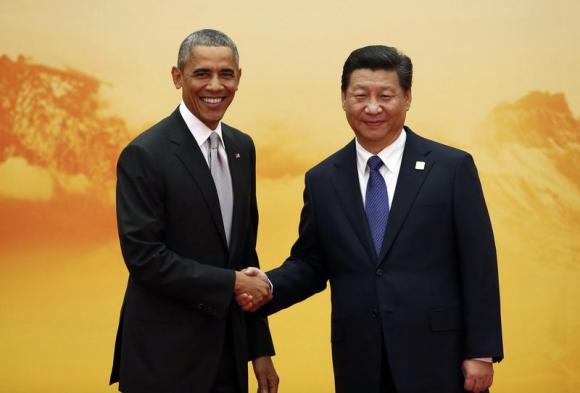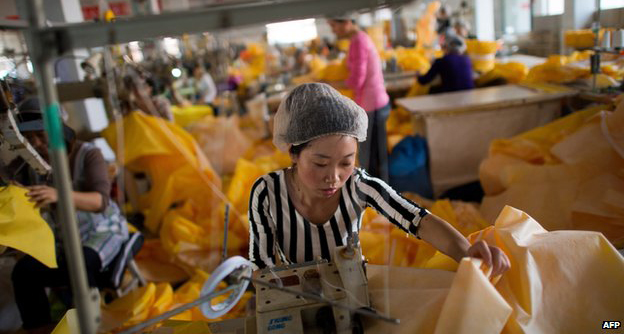China has made the headlines this month, as leading economists at the Bank of America reveal that a Chinese financial crisis is highly probable in the coming year. BBC Business reporter Lawrence Knight has speculated that the Chinese authorities may incite racial tensions to divert public attention from any such crisis, leading to concern over the impact this could have on racial minorities in Tibet and other sensitive areas.

U.S. President Barack Obama with China’s President Xi Jinping during APEC forum in Nov 2014
Photo: REUTERS/Kim Kyung-Hoon
China is heading towards a financial crisis just months after being declared the world’s largest economy, experts warn.
Bank of America Marrill Lynch suggest a “credit crunch”, or mass debt default, is highly probable over the coming year. “Few countries that had grown debt relative to GDP [Gross Domestic Product] as fast as China did over the past few years escaped from a financial crisis in the form of significant currency devaluation, major banking sector recap, credit crunch and/or sovereign debt default (often a combination of these),” Stated Bank of America Merrill Lynch strategists David Cui, Tracy Tian and Katherine Tai. BBC Business reporter Lawrence Knight has speculated that China “may be tempted to drum up xenophobia as a way of shoring up public support” in the face of growing economic woes. A similar tactic was employed at the beginning of the 2008 global economic crisis, when China turned attention towards disputed territory in the South China sea to distract from economic difficulties at home.
China’s economy has historically relied on export and investment in housing and infrastructure in order to drive its rapid growth, so when the world financial crisis hit in 2008, severely reducing export demand from deflating western economies, China turned to even greater investment to bolster inflation.
China released cash in to the economy, so increasing the availability of loans to fund public projects and property development and staving off the worst of the effects of the global recession. The cost was an over-investment in already saturated industries, creating more housing and infrastructure than the country could use.
At the end of 2014, China failed to hit its 7.5% inflation target for the first time since 1998. This has been interpreted as a sign of growing stagnation in the Chinese economy, which could signal the end of China’s building boom and cause problems for local governments who depend on property taxes to fund a large portion of their budgets.
With these heavily invested industries now thought to be in decline, there is a growing chance of mass defaults as developers are unable to cover their repayments. This could lead to rising unemployment, wage cuts, and a loss in confidence from international investors. “With huge amounts of ill-advised investment in redundant industrial capacity and vanity infrastructure projects, the country is now submerged by [a] tsunami of bad debt” said Anne Stevenson-Yang of the economic advice firm J Capital.
President Xi Jinping has responded to the slow-down with a push for long overdue reforms, hoping to shift the economy towards consumer spending, currently at less than 35% of GDP as compared to 50-70% in most other countries, in order to fill the growth hole left by collapsing development industries.
China is under further pressure to maintain the value of the Yuan, as members of the elite and China’s middle class try to send their money out of the country. Beijing has placed a limit of $50,000 on annual foreign exchange for each citizen, as sales of Yuan contribute to currency devaluation. However, some have exploited gaps in the system, purchasing US dollars through, among other methods, online payments and borrowed bank accounts. Beijing was forced to spend nearly $100 billion of its $3.99 Trillion foreign currency reserve on Chinese Yuan, in order to maintain demand for the currency in the third quarter of 2014.
In international news, China is at odds with the United States over their proposed “Trans Pacific Partnership”, a trade agreement between the US and several other North American and Asia-pacific states – with the notable exception of China. The Chinese government is lobbying for a competing Trade alliance, the “Free Trade Area of the Asia Pacific”, which would safeguard their economic interests in the region.
Despite an apparently cloudy outlook for the Chinese economy, many have welcomed the change as a much needed and long over-due re-balancing of China’s investment-heavy fiscal policy. Though there are likely to be difficulties in the short term, China’s abundant resources leave it well positioned to weather the storm and emerge from the troubles without much long term damage.





 Print
Print Email
Email